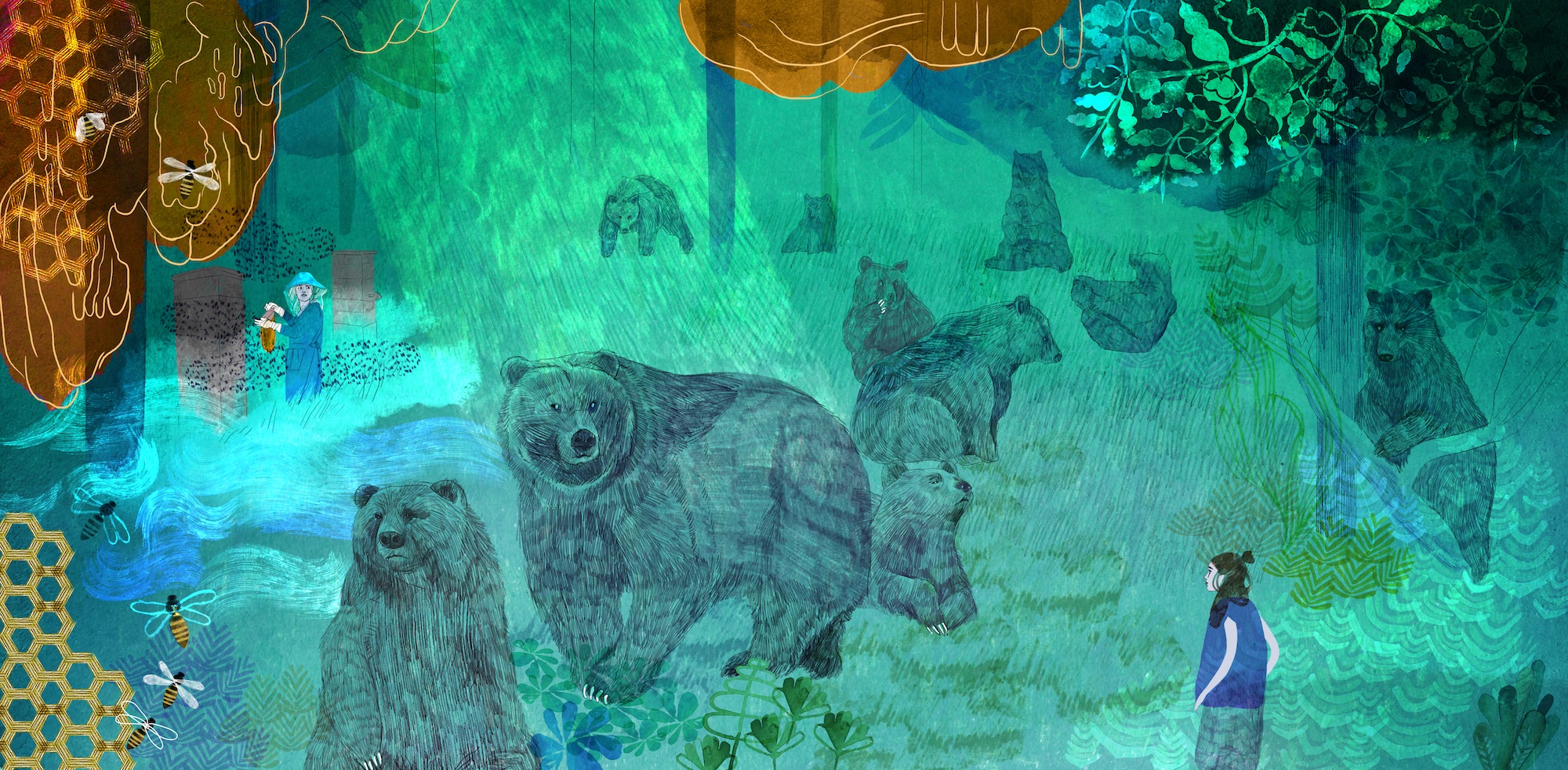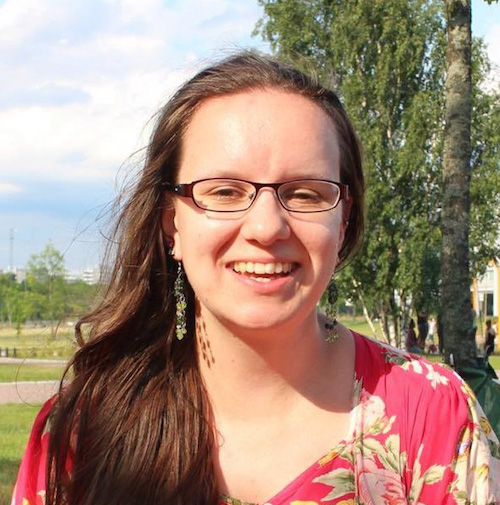Birch Daughter
by Sara Norja
Illustrated by Satu Kettunen | Edited by Julia Rios
Copyedited by Chelle Parker
November 2018
My father did not want me to go north. “Aino,” he said, “your mother is long gone. There’s nothing we can do.” His eyes were deep with mourning from all the years without her.
But the forest-folk had told me otherwise, whispering into my dreams. I prepared for a journey despite my father’s objections. “Yes, Mother was turned to a tree through dead Rasantaja’s evil spell. But the spark of her spirit is still within her. I’m going to save her, change her back. The forest-folk told me I could do it.”
My father told me that the spell was too strong to break, that I should never trust the forest-folk. But the thought of my mother trapped within a gnarled birch tree in the far north was too much for me to bear. I had to go, even just to see her.
Through the spring I travelled, the woods slick with melting snow. When the leaves were budding, I reached the northern shore. My stomach clenched in despair. I could see the island where my mother was imprisoned, but how would I ever get to her through the rocky, stormy stretch of sea? I didn’t have a boat. I didn’t have anything except my love and my wits and the knife my father had given me when he realized I was truly going north.
In my frustration I yelled at the rocks and the desolate sea. “Oh, how I wish I could get to the island!”
A deep voice behind me said: “Do you, truly?”
I turned, and my heart froze in my chest. It was a bear, bigger than any I had seen before. I stayed stock still, as you must do when a bear walks up to you.
“I wish it,” I said, averting my eyes. You don’t look a bear in the eyes.
“Then I will take you,” said the bear. I clambered onto its great back, and it swam steadily towards the island. I clung to its fur, fearing the currents and rocks, but the bear took us safely to shore.
I saw my mother at once: the only tree on the rocky island, a small stunted birch stretched out pitifully into the air. “Mother!”
She had been gone so long. I had grown into a woman in those years. Would she even recognize me? But of course all that did not matter if I couldn’t change her back. I laid a hand on the slender bole of the tree. Thin white layers of bark were ripping off in little shreds, torn by the harsh sea winds. I couldn’t feel any essence of my mother in there.
I had to break the spell first, and I realized that the forest-folk had not told me how. They hadn’t wanted to help me, merely to trick me like in all the tales of the underground folk. My bitter tears fell onto my mother’s tiny new leaves. But my salt grief was not enough to transform her. I didn’t know what I had expected. Just because I missed her, just because I was her daughter and cried for her, didn’t mean Rasantaja’s powerful curse would be lifted.
The bear’s growl of a voice startled me. “A spirit dwells within that tree,” it said. “It holds another form within it.”
“It’s my mother.” I could barely choke the words out. “But I’ve made this journey for nothing. I can’t break this spell.”
“But perhaps,” said the bear, “I can.”
It sang a strange song, a deep resonating growl that rang through the rocks of the island. I had never known that bears held such magic.
The birch tree twisted, shuddered, shifted. And there was my mother, shivering naked in the cold sea wind, her hair grown long and transformed to silver. She huddled on the rocks, eyes like a wild animal’s. But a happiness spread deep within me.
“Thank you,” I gasped. “Noble forest-lord, honey-clawed creature, how can I repay you for this?”
The bear’s sharp teeth glinted in the sunlight. “To pay for the journey to the island, and as the price for your mother’s transformation, you will come to my court and serve as one of my summer-slaves.”
I nodded. I couldn’t do anything else, for this bear had done us a great favour. “What about my mother?”
The bear growled again, a deep humming magic. “I’ve called the north wind to take her home.” And indeed, the wind was blowing stronger than ever now.
I barely had time to even greet my mother. There was a glint of recognition in her eyes, but I hesitated to touch her, and the next moment she had been swept away by the wind. Tears stung my eyes. I had longed to stand enfolded in her strong arms just like I had as a child. The same wind that had buffeted her birch-bark skin for seven years was now sweeping her home on its back, at the command of the great bear.
She had been taken from me — but she was being taken home, to my waiting father. I hoped his gentle hands and soft voice would eventually remove the fey, wary look from my mother’s eyes.
“Come,” growled the bear. I followed its ambling path from the treeless northern hills down to where the endless forest’s first trees raised their heads. I followed the bear into its realm, bound by my debt.
The bear’s court was full of buzzing bees, summerlight, ants’ nests, deep growls. I discovered that the bear was the matriarch of her clan, the hugest of them all. She had a great many bears in her retinue, so many that in my first days I was in a constant state of terror. But the matriarch had also enslaved or tricked humans into her service.
Chief among these, in my eyes, was the beekeeper who lived amidst a flurry of the buzzing creatures, taking care of the seven hives that kept our matriarch and her kin dripping with honey. She had been a village witch in her past life — the life she hoped to return to once her servitude was done. Craving honey, the bears had stolen her to be their summer-slave at the start of the season.
“My village doesn’t have a witch,” I said shyly.
I kept eyeing this girl. She was as wild as a summer berry, and as beautiful, in her strange protective beekeeper’s clothes. I shivered with a strange desire when she took off her veiled hat and I saw her weather-beaten face for the first time.
During that summer we shared a delirious courtship. I was so removed from the ordinary world I had lived in, so bewildered by the odd customs and exhausted by the constant food gathering, that when we first kissed, I did not question it. I knew of no women who kissed other women in this way, but a summer-spell was on me and I cared little about such things. The beekeeper and I shared sweet kisses when our work was done, when the bears were out carousing with the forest-folk. We whispered tender names into each other’s ears, we went swimming in the cool lake-water, we lay together skin and skin. Despite my servitude, I was happier than I had ever been, glowing with summer’s heat and the beekeeper’s touch.
“Come home with me,” I said, when summer was nearing its end, the cloudberries ripening in the marshes near the forest.
“Yes,” said the beekeeper. I was drowning in her eyes, deep as the lake.
When the geese began to arc southwards across the sky and the rowanberries were reddening, I went to the matriarch after a long day of gathering food for the bears to gorge on before they curled up in their caves. “Summer will soon be gone, and with it my debt to you.”
The bear laughed, a rumbling growl that chilled my heart. She caressed my neck with her big claws. “I’ve developed a liking for you, little birch-daughter. No, you won’t be going home when the leaves fall, when the first frost hardens the ground. You will stay and sleep with us over the winter, and take care of our cubs when they are born.”
The matriarch wished to work me till I perished. To her face I bowed, acquiescent and obedient. In my heart I rebelled. I wanted to go home, to my mother and father and the familiar paths of our home woods. I wanted to go south with the beekeeper.
From then on, we whispered of things other than tenderness. We clung close to each other during the darkening nights, the stars a bright belt above us. We planned our escape. The matriarch had broken her promise to me, so I didn’t feel honor-bound to stay. We gathered what rags and warm clothes we could find. We skinned and tanned the carcasses that we hunted for the bears, and stitched them together with sinew to make rough cloaks for ourselves. We told the bears that we were making me blankets to keep me warm during the long wintersleep. They were getting drowsier as the year wound to its end, and didn’t mind us.
The first frost came, spreading brittle and fragile on the puddles and lake-shores, weaving white patterns onto the lichen and lingonberry stems. It was time.
The forest-folk brewed a strange nectar that smelled of sleep-musk, gave it to the bears for their slaves to drink. This nectar would send us into a deep bear’s slumber lasting through the winter. The bears were already piling up in their caves, stuffed full and sated with food. I positioned myself near the smallest cave’s entrance. The matriarch slept there alone. I piled the fur cloaks over myself and pretended to drink the sleep-nectar. The great bear was already snuffling sleepily. I poured the nectar onto the ground near me, leaving its delicately carved wooden bowl beside me. I settled down, breathed deep, letting myself fall asleep; but into an ordinary human sleep, not the enchanted winterlong slumber that had been intended for me.
I awoke in darkness, the strong musk of bears filling my nostrils. I listened. The bear matriarch, my slave-master, was breathing in deep, steady growls. Her breathing was already slowing as her body settled into hibernation.
I gathered my fur cloaks tight around me, and crept out of the cave, tense as a bowstring. The matriarch’s breathing did not change. I hurried to the lakeside, fear clutching at my heart. But the beekeeper was waiting as we had agreed.
Her teeth shone in the dark as she grinned with relief. “Now we must get away as quickly as we can,” she said. “Let’s take the boat.”
There was a rowboat that I and the other human slaves had used in the summer to catch fish for the bears. The lake was not yet frozen over. Trembling with cold, we piled on our cloaks and pushed the boat out. The crescent moon did not bring much light, and it was dangerous to row, but I had learned the ways of the lake well enough, and we slid safely southwards along its smooth waters.
For many days we feared that the bears would wake up and notice I was gone, and send the forest-folk to chase us. After that fear had abated, our greatest fear was the gathering cold. Luck was with us, though, and the first snow came only when we had reached lands settled by humans. They were bewildered by our wild appearance, but nevertheless we were well treated at the first farmhouse we came across. They gave us proper boots, hand-me-downs from long-lost sons, and they fed us sweet oat porridge. I almost cried at the familiar taste.
Snow fell, the night sky glittered with frosty stars, and winter was truly upon us. We hitched our way towards my home, the beekeeper giving witch’s advice on ailments and sore hearts, I lending a hand in whatever task was needed. Finally we were nearing the village I had grown up in. A kindly woodsman brought us on his sled to a settlement nearby, separated from my village by a mere stretch of forest. I thanked him profusely, and the beekeeper gave him a pouch of dried nettles to keep by his heart.
We were almost at the solstice and sundown was nearing, but the beekeeper and I set off down the tramped-down forest path nonetheless. “We’ll be all right. I know the way,” I said, clasping her close for a moment.
Her kiss on my mouth was a breath of heat amid the winter-still air. “I’m nervous.”
I stopped to think about it. I had no idea what my parents would think of me bringing a strange witch-woman home. I realized that I did not even know if my mother had been brought safely home by the wind commanded by the bear, and felt a twist of fear. “I’m nervous too,” I said after a while, “but I want you with me.”
We trudged along the wandering path, the fir trees clustering up all around us. The snow made everything brighter despite the gathering twilight, but the blue moment was approaching. Yet by the familiar turns of the path and the rocks by its side, I knew we were almost at the village and would make it home before the darkness took over the forest.
I heard a strain of music then, such a sweet soaring of fiddle and flute that my heart rose up to meet it. Before I knew it, my body was moving in a polska, feet lifting from the snowy ground as light as summer leaves. The path was too constricting for my movements. I wanted to go where the music was coming from. I could hear happy shouts, I could hear leaping and laughing and the steady, hypnotic beat rising from the melody.
Someone caught me by the arms, held me imprisoned. I struggled. I needed to follow the music.
“Sweetling!” said a voice. “It’s Tellervo’s people, it’s the forest-folk. You don’t want to go and join their dance. If you do, you’ll wake up frozen to death in the morning.” The voice grew fierce. “And I will not lose you.”
The person slapped me on the face. The sharp shock of a bare hand on my frost-nibbled skin brought me spinning back into the real world where following forest-music meant foolishness and death after a delirious night of dancing. Dazed, I looked into the beekeeper’s deep eyes. I was shivering. I could still hear the music, but now I could sense the wild edge to it and knew this dance was not for mortal folk.
I held the beekeeper tight for a moment, comforted by the bulk of her body. Then we walked the last stretch of path and emerged at the outskirts of my village. Snow fell on us like feathers.
I caressed the carven piece of driftwood that my father had made into a door-handle when I was a child. I took a calming breath and knocked.
The door opened, and there she was, my father behind her.
“My dearest daughter.” My mother’s voice was rich as honey, deep with wonder. A sharp happiness bordering on pain bit into me like the frost. “Aino.”
Hearing my name was like a sip of fresh well water. I had almost forgotten it in the bear’s court. The beekeeper and I had not needed names.
A fey look still lingered in the depths of my mother’s dark eyes, but there was a calmness to her that she hadn’t had when I’d helped free her, when she had shivered on the shore after seven years of tree-life. She was safe, she was home, she had been home all this time.
My father’s face bore more lines than it had when I had left to save my mother. “My child, you’re late. I expected you after the summer, after your mother told me you had bargained with a bear.”
“I’ll tell you all about it.” My voice sounded choked, and it wasn’t only the rasp of the bitter cold. I turned; there was my beekeeper behind me on the doorstep, cautiously waiting. “Can we come in?”
Only then did my mother and father seem to notice that there was someone else there under the eaves of the house, seeking cover from the ever-falling snow. “Come,” they said, “come out of the cold.”
I took the beekeeper’s hand in mine and led her inside.


